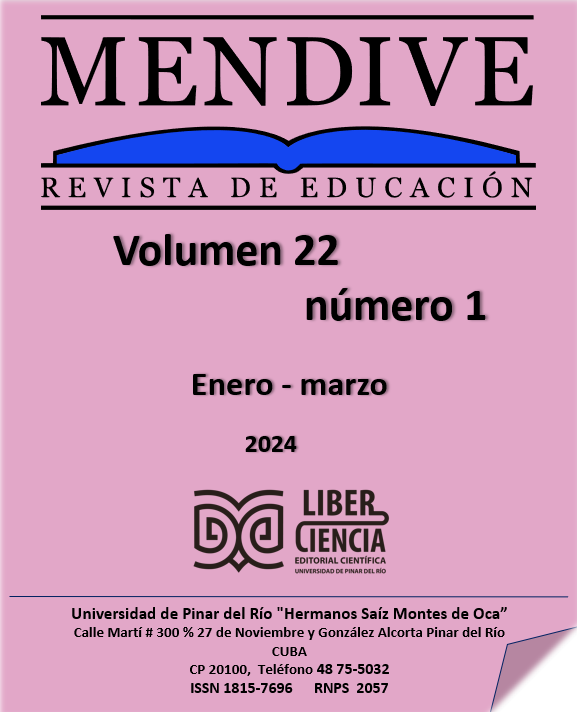Physical activity in relation to social interaction skills in students with intellectual disabilities
Main Article Content
Abstract
Physical activity is a right of every human being, it affects the strengthening of conditions for work; transformation of nature; the struggle and preservation of peace; in the physical-functional development of the individual and the formation of character; ethical, moral and volitional qualities in the individual and social. The research aims to assess the possibilities of physical activity to favor social skills in students with intellectual disabilities, by contributing to the promotion of a healthy generation, physically prepared according to their potentialities, their development needs corrective work and/or compensatory that improves and increases the possibilities of movements, towards the development of social relations in the contexts where it develops; For its development, theoretical, empirical and mathematical statistical methods were used, which made it possible to verify the declared scientific problem from the characterization of the selected sample, from the determination of the dimensions and indicators that allowed arriving at regularities, a great importance is attributed to it. educational value by exploring the environment and developing communicative relationships, as well as, they can build topological, temporal and spatial notions in different situations of movement, it also places the student with intellectual disability in situations of interaction with others, and requires him to seek resources or help to solve the activity, this favors relationships with others and achieve independent action.
Downloads
Article Details

This work is licensed under a Creative Commons Attribution-NonCommercial 4.0 International License.
References
Camargo, BP., (2021) Desarrollo de habilidades de interacción social y escolar a través del juego, en los estudiantes de la Escuela Rural Tanacuta del municipio del Cerrito Santander. Especialización en Pedagogía de la lúdica (977). Bogotá. Colombia. http://hdl.handle/11371/4622, https://repository.libertadores.edu.co/
Gómez, A. (2019) Acciones metodológicas para contribuir al proceso de Educación Física inclusiva: Una aproximación al tema. Mendive. Revista de Educación, 17(1),
Guerra, S., (2018) Los estudiantes con necesidades educativas especiales. Recursos y apoyos para su atención educativa. Revista electrónica en Educación y pedagogía, 2(2), 51-66. https://www.redalyc.org/journal/5739/573962519003/movil/
Guerra, S., Acudovich, S., (2014) Interpretación biopsicosocial de la atención educativa a niños, adolescentes y jóvenes con retraso mental. Actualidad de la atención a los niños y adolescentes con necesidades educativas especiales. La Habana: Editorial Pueblo y Educación.
Guerra, S., Laborit, D., (2013) Necesidad del perfeccionamiento de la educación de escolares con retraso mental en las condiciones actuales del desarrollo educacional. Sobre el perfeccionamiento de la Educación Especial. La Habana: Editorial Pueblo y Educación
López, JA. (2021, del 30 de abril al 2 de mayo) Semillero deportivo. Conferencia web. Primer Congreso Internacional Ciencias de la Salud y el Deporte. Méjico
Monjas, MI., (1993) Programa de enseñanza de habilidades de interacción social (PEHIS) para niños y adolescentes. Editorial CEPE. España. https://www.researchgate.net/publication/39132103_Programa_de_ensenanza_de_habilidades_de_interaccion_social_PEHIS_para_ninos_y_ninas_en_edad_escolar
Mutaner, JJ., (2020). La igualdad de oportunidades en la escuela de la diversidad. Universitate IIIes Balears.
Valdés, I., Miranda, V., Fuentes, N., (2021). Proceder metodológico para la elaboración y puesta en práctica de situaciones de aprendizaje. Libro digital. IV Taller de Didáctica y Aplicación de las Ciencias Básicas, páginas 121-133. X Convección Científica Internacional. Universidad Integrada e Innovadora. http://www.umcc.cu/evento-cium-2020/
Valdés, I; Guerra, S; Camargo, M. Las habilidades de interacción social. Un puente hacia la inclusión social. Mendive. Revista de Educación, 18(1), 74-88.
Valdés, I., Mainegra, D. Guerra, S., (2015). Reflexiones sobre la comunicación para la interacción social en el escolar con retraso mental. Revista IPLAC, (2140)
Valdivia, P., Farias, C., Espoz, S., (2020). La metodología del juego en el área de Educación Física. ISBN 978-84-1324-591-1. Editorial Dykinson.


